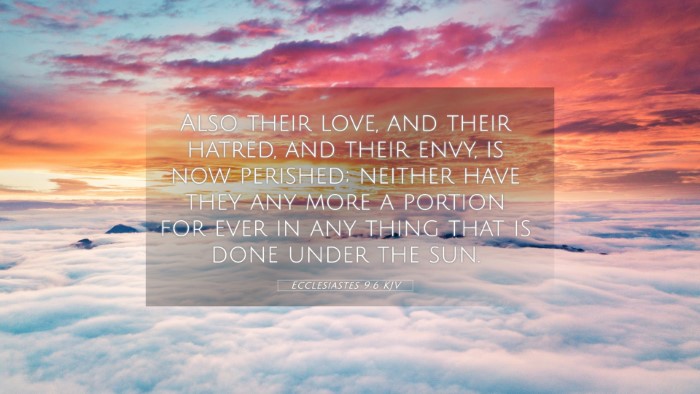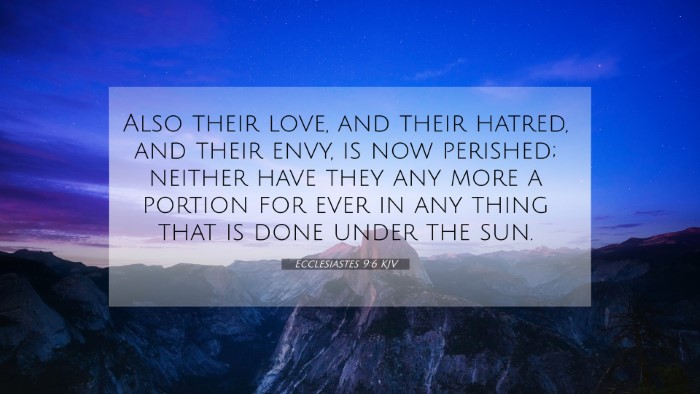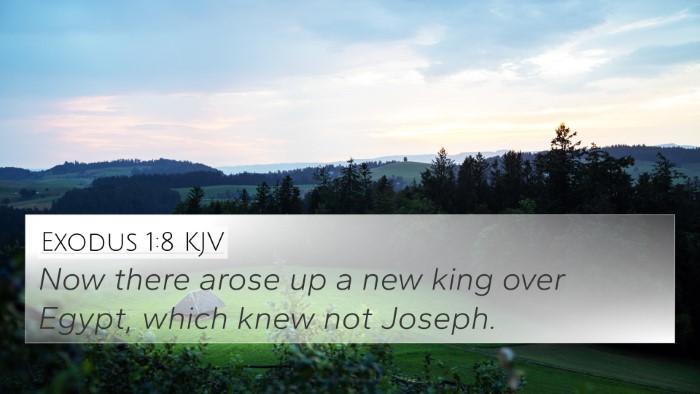Understanding Ecclesiastes 9:6
Ecclesiastes 9:6 states, "Their love, and their hatred, and their envy, is now perished; neither have they any more a portion for ever in any thing that is done under the sun." This verse reflects on the finality of death and the transient nature of earthly experiences and emotions.
Summary of Biblical Meaning
The book of Ecclesiastes is often seen as a reflection on the meaning of life and the inevitability of death. In chapter 9, the author expresses the notion that once humans pass away, their experiences—both positive and negative—cease to have any lasting effect. This thought encourages readers to ponder the significance of life and their actions within its limited timeframe.
Insights from Commentaries
- Matthew Henry: Henry emphasizes that the verse highlights the futility of earthly endeavors in the face of death. He notes that love, hatred, and envy—which fuel so much of human interaction—are rendered moot in death. Thus, Henry encourages believers to prioritize eternal values over temporary emotions.
- Albert Barnes: Barnes points out the comprehensive nature of what is lost after death. He insists that the verse serves as a reminder of the ultimate equality of all men in death, regardless of their life circumstances. This realization leads to a more profound reflection on the importance of wise living and achieving lasting virtue.
- Adam Clarke: Clarke reflects on the theological implications of the verse, interpreting it within the framework of God's justice. He indicates that the perspective on mortality should shape one's priorities in life, leading to a focus on that which endures beyond the grave.
Bible Verse Cross-References
To deepen the understanding of Ecclesiastes 9:6, we can explore various cross-references that align with its themes:
- Hebrews 9:27: "And as it is appointed unto men once to die, but after this the judgment." This verse reinforces the inevitability of death and its consequences.
- Psalm 146:4: "His breath goeth forth, he returneth to his earth; in that very day his thoughts perish." This verse parallels Ecclesiastes by noting the finality of human thoughts and emotions at death.
- Ecclesiastes 3:19-20: "For that which befalleth the sons of men befalleth beasts; even one thing befalleth them: as the one dieth, so dieth the other; yea, they have all one breath." This passage emphasizes the shared fate of all living beings.
- Job 14:5: "Seeing his days are determined, the number of his months are with thee, thou hast appointed his bounds that he cannot pass." This reinforces the predetermined nature of human life.
- 1 Corinthians 15:55: "O death, where is thy sting? O grave, where is thy victory?" This verse captures the ultimate victory over death, highlighting the Christian hope beyond mortality.
- Philippians 1:21: "For to me to live is Christ, and to die is gain." This verse introduces a contrasting perspective on death for believers, as it can represent a deeper union with Christ.
- James 4:14: "For what is your life? It is even a vapor, that appeareth for a little time, and then vanisheth away." This reflects the transient nature of life, parallel to Ecclesiastes 9:6.
Thematic Connections
The verse plays a vital role in the broader themes of the book of Ecclesiastes and serves as a bridge for understanding key Biblical messages:
- Mortality: The exploration of human mortality is central to the book, urging readers to live wisely and intentionally.
- Transience: The fleeting nature of life and human emotions serves as a reminder to focus on what is eternal.
- Human Emotions: Understanding the impermanence of love, hatred, and envy highlights the importance of cultivating lasting virtues.
Conclusion
Ecclesiastes 9:6 invites believers to reflect on life’s purpose in view of mortality. The cross-references provided not only enhance the understanding of this verse but also create a richer framework for interpreting Scriptures as a cohesive whole. By utilizing tools for Bible cross-referencing and a systematic Bible reference guide, individuals can delve deeper into the connections between Bible verses, uncovering profound spiritual truths that resonate across the Biblical narrative.
Using Cross-References for Spiritual Growth
Engaging in cross-referencing Bible study methods allows a more profound understanding of Scripture. It aids in:
- Identifying connections between Old and New Testament teachings.
- Drawing links between different Biblical themes.
- Providing insights for sermon preparation and personal growth.
Cross-referencing not only fosters deeper insight into particular verses but also enriches one's overall understanding of the Bible, grounding the believer in its messages of hope, wisdom, and truth.









